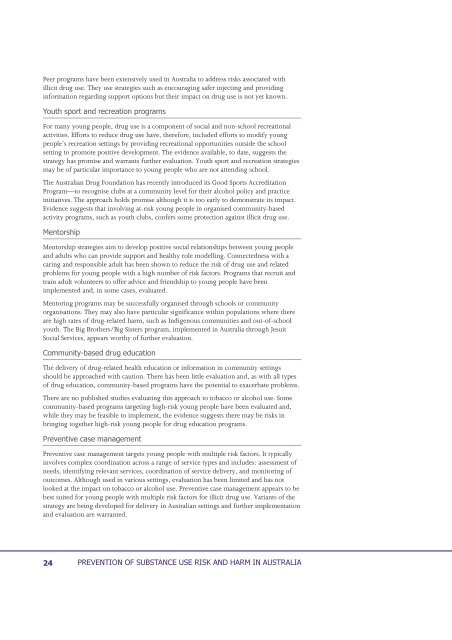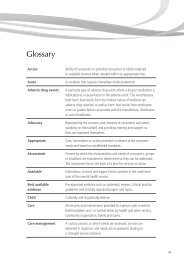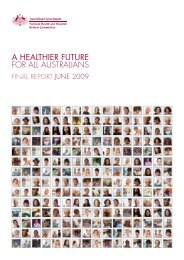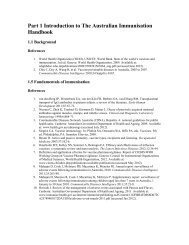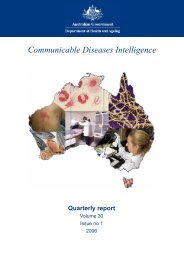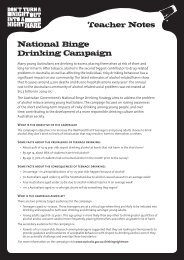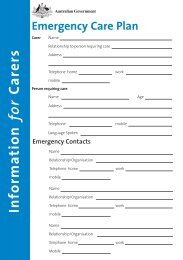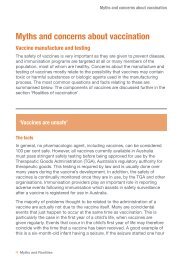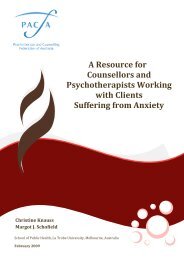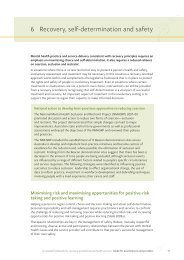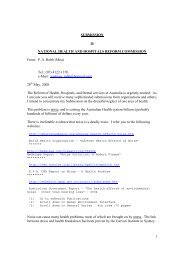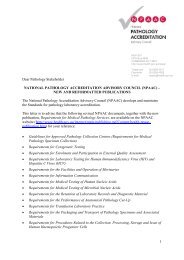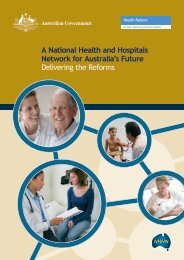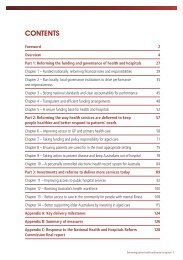Summary - Department of Health and Ageing
Summary - Department of Health and Ageing
Summary - Department of Health and Ageing
Create successful ePaper yourself
Turn your PDF publications into a flip-book with our unique Google optimized e-Paper software.
Peer programs have been extensively used in Australia to address risks associated with<br />
illicit drug use. They use strategies such as encouraging safer injecting <strong>and</strong> providing<br />
information regarding support options but their impact on drug use is not yet known.<br />
<br />
For many young people, drug use is a component <strong>of</strong> social <strong>and</strong> non-school recreational<br />
activities. Efforts to reduce drug use have, therefore, included efforts to modify young<br />
people’s recreation settings by providing recreational opportunities outside the school<br />
setting to promote positive development. The evidence available, to date, suggests the<br />
strategy has promise <strong>and</strong> warrants further evaluation. Youth sport <strong>and</strong> recreation strategies<br />
may be <strong>of</strong> particular importance to young people who are not attending school.<br />
The Australian Drug Foundation has recently introduced its Good Sports Accreditation<br />
Program—to recognise clubs at a community level for their alcohol policy <strong>and</strong> practice<br />
initiatives. The approach holds promise although it is too early to demonstrate its impact.<br />
Evidence suggests that involving at-risk young people in organised community-based<br />
activity programs, such as youth clubs, confers some protection against illicit drug use.<br />
<br />
Mentorship strategies aim to develop positive social relationships between young people<br />
<strong>and</strong> adults who can provide support <strong>and</strong> healthy role modelling. Connectedness with a<br />
caring <strong>and</strong> responsible adult has been shown to reduce the risk <strong>of</strong> drug use <strong>and</strong> related<br />
problems for young people with a high number <strong>of</strong> risk factors. Programs that recruit <strong>and</strong><br />
train adult volunteers to <strong>of</strong>fer advice <strong>and</strong> friendship to young people have been<br />
implemented <strong>and</strong>, in some cases, evaluated.<br />
Mentoring programs may be successfully organised through schools or community<br />
organisations. They may also have particular significance within populations where there<br />
are high rates <strong>of</strong> drug-related harm, such as Indigenous communities <strong>and</strong> out-<strong>of</strong>-school<br />
youth. The Big Brothers/Big Sisters program, implemented in Australia through Jesuit<br />
Social Services, appears worthy <strong>of</strong> further evaluation.<br />
<br />
The delivery <strong>of</strong> drug-related health education or information in community settings<br />
should be approached with caution. There has been little evaluation <strong>and</strong>, as with all types<br />
<strong>of</strong> drug education, community-based programs have the potential to exacerbate problems.<br />
There are no published studies evaluating this approach to tobacco or alcohol use. Some<br />
community-based programs targeting high-risk young people have been evaluated <strong>and</strong>,<br />
while they may be feasible to implement, the evidence suggests there may be risks in<br />
bringing together high-risk young people for drug education programs.<br />
<br />
Preventive case management targets young people with multiple risk factors. It typically<br />
involves complex coordination across a range <strong>of</strong> service types <strong>and</strong> includes: assessment <strong>of</strong><br />
needs, identifying relevant services, coordination <strong>of</strong> service delivery, <strong>and</strong> monitoring <strong>of</strong><br />
outcomes. Although used in various settings, evaluation has been limited <strong>and</strong> has not<br />
looked at the impact on tobacco or alcohol use. Preventive case management appears to be<br />
best suited for young people with multiple risk factors for illicit drug use. Variants <strong>of</strong> the<br />
strategy are being developed for delivery in Australian settings <strong>and</strong> further implementation<br />
<strong>and</strong> evaluation are warranted.


